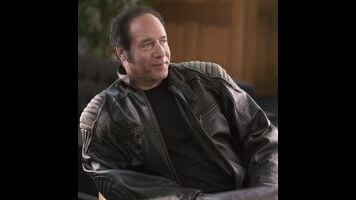Andrew Dice Clay wants the audience of his eponymous sitcom to know that he’s not the guy we see onstage. Here’s a guy who dates a strong woman, and who is pro gay marriage (if only because gay men know to keep it right and tight for their partners). He’s not the same guy who got a lifetime ban from MTV (that was lifted far after his cultural relevancy lapsed) and inspired a Saturday Night Live boycott. The first episode of his new Showtime series even sticks in an audience surrogate, a gay man, who openly voices his disdain for the “homophobic” Dice, only to be proven wrong (kind of).
At the same time, Dice is the same guy he was before. (For the remainder of this review, “Dice” will be used to refer to the eponymous protagonist of Dice, and “Clay” to the actor playing him.) He’s overly masculine and aggressive. He’s still all ego and bluster. He’s a chain smoker. He still wears fingerless gloves at all times. Clay is a little heavier and a little older than he was in his ’80s heyday, when he would pop his collar onstage and say “Ohhhh,” as if the love child of Arthur Fonzarelli and Pinky Tuscadero tried his hand at stand-up. He’s no longer punching down at the little people who happen to be less virile than him. Instead, Dice sometimes makes its hero the butt of the joke.
Clay’s shtick was always based around his masculinity and ego, in a response to the supposed eroding manliness of American society. But the biggest difference between “The Diceman” and Clay is that now his ego is the source of his mishaps and shenanigans, rather than the source of his talent. In a lot of ways, the Dice of Dice is portrayed as a sort of sitcom dad bumbling through life, barely eking out a respectable existence, despite a still-healthy sense of self. It’s that sense of self that separates him from other comedians who’ve created shows that directly reflect their lives and experiences, rather than creating scenarios that fit their persona. But unlike a lot of other comedians, Clay doesn’t ever wallow in his failure onscreen. He revels in the small victories.
So here is Dice now, living in Vegas with a busted career and mounting gambling debts. The smartest thing Dice creator Scot Armstrong does is stack the deck with a strong supporting cast to counteract Clay. Natasha Leggero plays Carmen, Dice’s long-suffering girlfriend, who could easily be pigeonholed as either a sex object or a nag who spends most of her time onscreen ruining Dice’s fun. But Leggero brings such an edge to Carmen that her role is less about rolling her eyes at Dice than rolling her eyes along with the audience. It’s not like Carmen gets her own plot lines or an inner life that doesn’t involve involve her famous boyfriend, but this is a fictionalized version of a guy who regularly referred to women as “piglets.” So the mere presence of Leggero—a stand-up whose entire persona is both influenced by and a rebuke of guys like Clay—says something about the Dice we’re seeing onscreen. (Lorraine Bracco plays a similarly badass lady on Dice, who at one point promises that her dick is much bigger than Dice’s and offers to show it to him.) Dice’s best friend is a guy with the unexplained nickname of Milkshake, played by Kevin Corrigan, whose laconic personality adds a surreal air to Dice. In the first episode, Milkshake drinks a cup of gravy while walking through a casino because he wanted some gravy, so why the hell not?
That largely leaves Clay as the weakest link in the cast. He was never a comic known for his acting prowess although, like before, Clay can play Dice. But when forced out of his comfort zone—like in the surreal second episode when Adrien Brody decides to shadow Dice for research in his upcoming one-man show about masculinity—he can’t pull off the task in the same way that, say, Louis CK feels so comfortable working in the more bizarre elements of his show. It’s perhaps surprising that a guy whose persona is as straightforward and broad as Dice’s is starring in a show where things can get weird—as in Wayne Newton referring to Dice as a ”fuckface” weird—but the show works better when Dice is in sitcom mode, rather than trying to stretch his dramatic chops.
But that’s the problem with Dice in a lot of ways. There’s been a spate of comics playing variations of themselves, warts and all, as of late. Sometimes it works—Louie is the gold standard, while The Jim Gaffigan Show takes a more traditional tack—and sometimes it doesn’t. But Dice isn’t looking to be as vulnerable as Louis CK can be, or even as quietly subversive as Gaffigan. He isn’t bringing anything new to the table, even if treating women with basic decency is novel for him. That’s the problem when there are other comedians doing incredibly exciting things with the semi-autobiography. Andrew Dice Clay spent so much time constructing his persona that he can’t really do anything else with it.
























![Rob Reiner's son booked for murder amid homicide investigation [Updated]](https://img.pastemagazine.com/wp-content/avuploads/2025/12/15131025/MixCollage-15-Dec-2025-01-10-PM-9121.jpg)
















